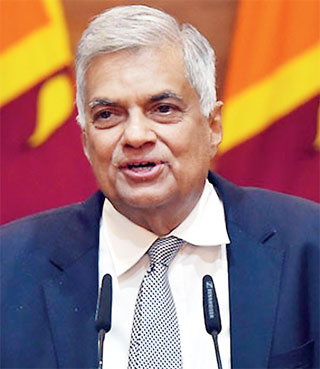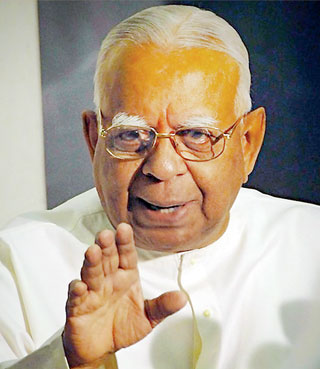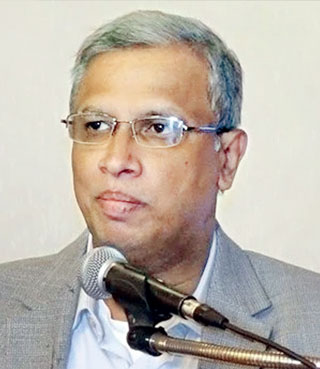Sunday Feb 22, 2026
Sunday Feb 22, 2026
Wednesday, 11 January 2023 00:20 - - {{hitsCtrl.values.hits}}

President Ranil Wickremesinghe

TNA Leader R. Sampanthan

TNA Spokesperson M.A. Sumanthiran
|
 Talks are currently on between the Government of President Ranil Wickremesinghe and the Tamil National Alliance (TNA) led by veteran Trincomalee district MP Rajavarothayam Sampanthan. The Government-TNA talks had not commenced at the time this column was written on 9 January. However, talks between the Government and TNA delegations have been scheduled for three days from 10 to 12 January. Hence the Government-TNA talks should be reportedly underway when this article is published on 11 January. The Government-TNA talks take place under the aegis of an all-party conference.
Talks are currently on between the Government of President Ranil Wickremesinghe and the Tamil National Alliance (TNA) led by veteran Trincomalee district MP Rajavarothayam Sampanthan. The Government-TNA talks had not commenced at the time this column was written on 9 January. However, talks between the Government and TNA delegations have been scheduled for three days from 10 to 12 January. Hence the Government-TNA talks should be reportedly underway when this article is published on 11 January. The Government-TNA talks take place under the aegis of an all-party conference.
The current dialogue is due to a commendable political initiative by President Ranil Wickremesinghe himself. With Sri Lanka’s 75th anniversary of gaining freedom from British rule drawing near, the President while addressing Parliament last year, expressed a desire to seek an end to the protracted ethnic crisis or the Tamil National Question before 4 February 2023.
This elicited a favourable response from most political parties represented in Parliament. Jaffna district MP and TNA spokesperson M.A. Sumanthiran stated that they were always ready to negotiate and arrive at a potential political settlement. The premier political configuration representing the Tamils of Sri Lanka in the Northern and Eastern Provinces is the TNA which has 10 seats in Parliament.
Thereafter President Wickremesinghe convened an all party conference on 13 December 2022. A broad consensus emerged at the conference that discussions should commence without delay with the objective of reaching an agreement by the 75th Independence anniversary. A tentative three-point plan to be discussed and implemented was also devised.
Firstly some of the outstanding issues concerning Tamils such as the release of political prisoners, release of private lands seized by the armed forces in the north and east and concrete answers to the question of enforced disappearances and missing person.
Secondly the full implementation of the 13th Constitutional amendment brought about by the 1987 Indo-Lanka accord.
Thirdly reaching agreement on envisaged Constitutional reform to provide an effective power sharing scheme.
While the first point stipulated a need for immediate results, the second and third points required only a blueprint outlining the contours of agreement at present. Implementation either in the form of Provincial Council elections or promulgating a new Constitution does not seem possible at the present juncture.
Tamil national question
Keeping the 4 February deadline in mind, the three tasks of resolving outstanding issues, full implementation of 13A and constitutional reform were to be achieved by having three parallel tracks instead of a sequential approach. What President Wickremesinghe’s Government and the TNA are aiming for is to resolve as many outstanding issues as possible by 31 January 2023 on the one hand and reach an agreement on Constitutional issues and the Provincial councils on the other. If all goes well, this would enable President Wickremesinghe to announce on the 75th Independence anniversary that a political agreement has been reached on the Tamil National Question.
Two informal meetings of a preparatory nature were held on 21 December 2022 and 5 January 2023 between the Government and TNA. The three-day talks from 10 to 12 January will address the key issue of power sharing. It is likely to be extended to 13 January also if necessary. Though the discussions would be mainly between the Government and TNA, it would be part of a general all party conference.
‘Thaipongal’ festival
The Government and TNA hope to reach a broad understanding on a power sharing political settlement by ‘Thaipongal’ on 15 January. The ‘Thaipongal’ is the unique harvest festival of Tamils. President Wickremesinghe will be celebrating Thaipongal as a national festival in Nallur on 15 January. If the contours of a power sharing settlement could be reached by Pongal, the nitty-gritty details would be worked out by 31 January.
TNA rumblings of discontent
Even as hopes of a political settlement loomed large on the political horizon there was a strong note of discord too. Rumblings of discontent began emanating from the TNA. A news report filed by The Hindu’s Colombo Correspondent Meera Srinivasan stated as follows:
“Citing the “lack of any action” by the government on Tamils’ urgent demands, Sri Lanka’s Tamil National Alliance (TNA) said it would “rethink” its decision to engage in talks with President Ranil Wickremesinghe, unless his government reports “actual progress” at the next scheduled discussion on January 10.”
“We have been highlighting three specific areas for immediate action – the release of political prisoners, answers to families of [forcibly] disappeared persons, and the persisting land grabs in the north and east. Despite making promises, the government is yet to take any action,” TNA spokesman and Jaffna legislator M.A. Sumanthiran told media on Thursday, following the third meeting between the Alliance and the President.”
Even though the TNA has articulated its disappointment and doubts over the lack of positive progress, the party is not likely to exit from the talks hastily. Earlier on while addressing the Tamil media in Jaffna, Sumanthiran stated that they were entering the talks without any faith in a positive result. He said we are engaging in talks to avoid being blamed for missing an opportunity to reach a political settlement by default.
Hence the TNA will not break off the dialogue arbitrarily. But it is preparing the Tamil people to not expect too much and be ready to expect the worst. Also the TNA wants to protect itself from criticism from its Tamil extremist rivals if the talks end in failure. The worst political nightmare from a TNA perspective is one where the Tamil party continues to participate patiently in the talks until 31 January and realise too late that they have been taken for a ride. So the TNA is cautious and is telling its constituency beforehand that everything is not hunky-dory.
Tensions in the TNA
Two other significant developments within the sphere of Tamil politics also casts doubts about the positive progress of talks. One is the sharpening of differences within the TNA. The chief constituent of the TNA, the Ilankai Thamil Arasu Katchi (ITAK) wants to contest the forthcoming local authority polls alone without forming a common list with members of the other two TNA constituents namely the Tamil Eelam Liberation Organization (TELO) and the Peoples Liberation Organization of Tamil Eelam (PLOTE). The ITAK says all three constituents should contest separately but remain together as the TNA.
The TELO and PLOTE reject this and threaten to isolate the ITAK by registering the TNA under a new formulation without the ITAK. The TNA is currently a loose configuration and not a registered political party. The TNA contests polls under the ITAK symbol of house. It is too early to predict whether the current intra-TNA controversy is a serious crisis that would result in a break-up or peter down as a tea cup tempest.
The other issue which has a direct bearing on the Government-TNA talks is the meeting of Tamil nationalist political parties held on 9 January. Although details are sketchy at this point of time, it appears that representatives of Tamil political parties such as the ITAK, PLOTE, TELO, EPRLF and TNP were rather doubtful about the Wickremesinghe Government being genuine in its declared intention of seeking a political settlement. It appears that the meeting decided that the TNA should participate on 10 January and request President Wickremesinghe to guarantee that all outstanding issues would be resolved by 31 January. If President Ranil Wickremesinghe does not display any positive signs of his bona fides on the matter, the TNA should walk out. It remains to be seen as to what happens in this regard.
Tamil political pessimism
The pessimism in Tamil political circles about the Government being genuine in seeking a power sharing political settlement is rooted in recent history. Attempts to reach a political settlement through negotiation ended in failure. Agreements signed by the ITAK with Sinhala dominated governments were honoured in the breach. The intransigent conduct of past governments was a major factor that contributed to the separate state demand and consequent armed struggle. It is against this backdrop therefore that this column briefly outlines the power sharing quest of Sri Lankan Tamils from independence to the watershed year of 1977 where the North-Eastern Tamils voted overwhelmingly for a separate state called Tamil Eelam.
The acknowledged leader of the Tamils at the time of Independence was well known lawyer G.G. Ponnambalam called “GG”.
The All Ceylon Tamil Congress (ACTC) led by him advocated “balanced representation” as its policy before Independence from the British. After independence Ponnambalam adopted “responsive cooperation” as his policy and joined the D.S. Senanayake Government as a cabinet minister. This caused a split in the ACTC.
Ilankai Thamil Arasu Katchi
The breakaway group led by S.J.V. Chelvanayagam formed the Ilankai Thamil Arasu Katchi (ITAK) called the Federal Party in English. It was the ITAK led by Chelvanayagam which introduced the demand for federalism into post-independence political discourse. Within a decade Chelvanayagam of the ITAK displaced Ponnambalam of the ACTC as the accredited leader of the Tamils.
The ITAK under S.J.V. Chelvanayagam was for federalism in principle. The party clamoured for a “Thamil Arasu” or Tamil State comprising the Northern and Eastern Provinces. The demand however was for a federal state within a united country. In practice Chelvanayakam was prepared to compromise for political arrangements falling far short of the federal ideal.
A tactic on which the ITAK relied on was power brokering and political bargaining. The expectation was that Sinhala dominated political parties would not be able to command clear majorities in Parliament and would require assistance from a third party to form governments. The ITAK was to be the “king-maker” third force capable of making and unmaking Colombo governments. Therefore the ITAK appealed to the Tamil voters that they elect party candidates as a “bloc” to broker and bargain.
1956 was a watershed with S.W.R.D. Bandaranaike riding to power on the crest of a “Sinhala only” wave. The ITAK led by S.J.V. Chelvanayagam won most of the Tamil and Muslim majority seats in the Northern and Eastern Provinces. Despite the clear political divide and the prevailing volatile situation both leaders attempted to arrive at some form of settlement by signing a political pact.
Banda-Chelva pact
The Bandaranaike-Chelvanayagam pact of 1957 (known as B-C pact) was the first instance of Sinhala and Tamil leaders in post-independence Sri Lanka (or Ceylon as it was then) attempting to resolve the Tamil national question through appropriate political arrangements.
In 1957 the B-C pact was for setting up regional councils. The north was to be one region while the east was to be two regions to accommodate Muslim interests. Three major grievances affecting Tamils in the spheres of language, land settlement and regional autonomy could have been addressed and redressed through the B-C pact had it ever been allowed to work.
The chief opposition United National Party (UNP) led by J.R. Jayewardene and Dudley Senanayake opposed it strongly. JR led a protest march against the pact from Colombo to Kandy. It was however aborted at Umbulgoda by S.D. Bandaranaike who was thereafter dubbed as the “Imbulgoda Verraya”. Several ministers and MPs within the S.W.R.D. Bandaranaike Government exerted pressure on the PM to dishonour the agreement. Members of the Buddhist clergy were mobilised by Eksath Bhikku Peramuna leader Mapitigama Buddharakitha Thero against the B-C pact. Members of the Buddhist clergy and laity mobbed Bandaranaike’s residence. Faced with this three-pronged opposition, Bandaranaike capitulated and in a symbolic act tore up the pact in public.
The jettisoning of the Banda-Chelva pact by S.W.R.D. Bandaranaike led to further deterioration of ethnic relations resulting in massive communal violence in 1958.
1960 March and July polls
1960 saw two elections to Parliament being held in March and July. A significant outcome of both polls was the reiteration by Tamil voters in the north-east that the Ilankai Thamil Arasu Katchi (ITAK) or the Federal Party was their chief political party. The ITAK won 15 comprising 10 seats in the north and 5 in the east in March. In July it won 16 including 10 in the north and 6 in the east.
In March 1960 the UNP under Dudley Senanayake had 50 seats and the SLFP under C.P. de Silva had 46. Both sides wooed the ITAK but Chelvanayagam opted not to support the UNP and arrived at an understanding with the SLFP. The Senanayake Government could not command a majority in Parliament and elections were held again in July. The SLFP and ITAK/FP arrived at an understanding. The Federal Party called upon Tamils in the south to support the SLFP. The SLFP got 75 seats and with the six appointed members had a razor thin majority. It had no need for Tamil support and the understanding with the ITAK was not honoured.
1965 March saw the UNP coming to power with 66 seats. The SLFP (42) LSSP (10) and CP (4) had 56 seats. If the ITAK which won 14 seats supported the SLFP coalition then Mrs. Bandaranaike could have formed a Government with the help of some independents and the six appointed MPs.
There was frantic lobbying by both parties for Tamil support. The ITAK smarting from SLFP betrayal in 1960 opted for Dudley this time. The Tamil Congress with three seats also supported the UNP. Dudley Senanayake formed what was called the “National Government” then. Eminent Queen’s Counsel and Chelvanayakam’s confidante Murugeysen Tiruchelvam became the local government minister.
Dudley-Chelva pact
The ITAK extended support to the UNP after protracted negotiations. Just as Chelvanayakam signed a pact with Bandaranaike in 1957, he signed one with Senanayake too in 1965. This was called popularly as the Dudley-Chelva (D-C) pact. A key element of the D-C pact was the setting up of district councils. Tiruchelvam was made local government minister to steer the district councils scheme through.
Unfortunately the district councils scheme became a non-starter. In a nutshell the situation was something like what happened in 1957. Then in the late 50s the UNP under J.R. Jayewardene and the Sinhala-Buddhist extremist forces found common ground in opposing the regional councils. Now in the late 60s the UNP was opposed by the SLFP and Sinhala Buddhist elements. “Dudleyge Bade Masala Vade” (The Tamil delicacy masala vadai was in Dudley’s stomach) was the slogan. To their eternal shame the Trotskyites and Communists went along with this chauvinist line.
A white paper on the district councils was presented in Parliament. The floodgates were opened for torrential waters of opposition. Within the UNP a “ginger group” of 16 MPs under Festus Perera opposed it. People like Cyril Mathew resigned from the party in opposition. Dudley even suspected JR of instigating protests from within the party. Senanayake lost his nerve. He did not want to go through with the district councils.
Unable to honour his pledge Dudley offered to resign but Chelvanayakam did not agree. The ITAK pulled out of the Government some months later when Tiruchelvam resigned over the Trincomalee Koneshwaram Temple sacred zone issue.
Interestingly the sixties of the 20th century had seen the ITAK reaching the high watermarks of its agitation cum negotiation strategy. The 1961 satyagraha was the zenith of its non-violent agitation; the 1965-69 period where it formed part of the Government was its peak in terms of the negotiation strategy. Both had now been tried and exhausted.
The 1970 electoral verdict delivered a shattering blow to Tamil ambitions of making and unmaking governments.
“Only God can save Tamils”
The United Front of SLFP (91) LSSP (19) and CP (6) had 116 seats in Parliament. The ITAK had 13 and Congress 3 but they were of no use as this steam-roller majority needed no props. SJV voiced Tamil frustration at this turn of affairs by proclaiming that “Only God can save the Tamil people now”.
One of the new regime’s first tasks was converting Parliament into a constituent assembly to formulate a new republican constitution. The LSSP veteran Dr. Colvin R. de Silva was constitutional affairs minister. Initially the ITAK or FP participated in the constituent assembly and tabled a proposal seeking to set up five autonomous units in the country. This was summarily rejected and the Federal MPs walked out. This constitutional exercise provided an opportunity to make a fresh start in forging justice and equality through power sharing. But it was lost. Furthermore the situation worsened.
Though the Soulbury Constitution was unitary in nature it had not been explicitly stated so. But the new constitution proclaimed itself as “Unitary”. It was an entrenched clause. The country became a repu. The island’s name ‘Ceylon’ was changed to Sri Lanka. Buddhism was given foremost place.
Section 29 of the earlier constitution that had provided limited protection to minorities was no more. It was Colvin who pithily summed up the future in 1956 during the Sinhala Only Bill debate by saying “One language two nations; two languages one nation”. Ironically the same Colvin’s constitution by ignoring Tamil aspirations was now making the ground fertile for seeds of secession to grow.
The political course of events took a new turn. The Tamils became disillusioned with the quest for federalism. It was seen as futile. On the ground there was broader Tamil unity with the Federalists and Congressmen coming together as the Tamil United Front (TUF). Youth power too came to the fore. The cry for a separate state called Tamil Eelam gathered momentum. Some youths became enamoured of an armed struggle to achieve this.
Tamil United Liberation Front
The TUF renamed itself as the Tamil United Liberation Front in May 1976. A formal demand for Tamil Eelam was adopted. The TULF contested the 1977 elections on a separatist platform seeking a mandate for Tamil Eelam and swept the polls winning 18 of 19 Tamil majority seats in the north-east. It was a historic turning point!
(The writer can be reached at [email protected].)